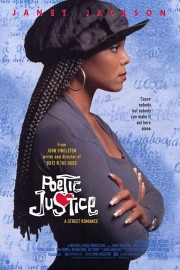Poetic Justice
John Singleton was both a trailblazer in growing representation in cinema, as well as someone who was too early. His first film, “Boyz N the Hood,” ushered in modern black cinema, and made him the youngest Best Director nominee in Oscar history. And yet, having finally watched that and his second film, “Poetic Justice,” in back-to-back years, I can’t help but think audiences weren’t quite ready for strong black voices in film. The only films of his post-“Boyz” to really get a lot of love at the box-office were his “Shaft” remake in 2000, and “2 Fast 2 Furious” in 2003; while this film debuted at #1, it didn’t really set the box-office on fire after that. That is a shame, because he’s got a thoughtful, vital voice that comes through in his films we should have paid more attention to at the box-office from the beginning; maybe his last feature film wouldn’t have been a formulaic Taylor Lautner thriller in 2011.
I forgot that “Poetic Justice” was an Oscar nominee, for the lovely Janet Jackson ballad, “Again,” and though I still think the Academy made the best choice that year, I’m glad to see this film at least got that love from voters. The song isn’t just one of those gratuitous ballads written so the film can maybe get an Oscar nomination; the theme is woven throughout Singleton’s film, as Jackson’s Justice goes on a road trip to Oakland with her friend, Iesha (the wonderful Regina King), her boyfriend, Chicago (Joe Torry), and his friend and co-worker, Lucky (Tupac Shakur). Justice is going to Oakland for a hair show, while Lucky is going to visit his cousin, and Iesha and Chicago are going with, and they have some mail to deliver, as well. That structure is an ideal one for this tender love story that reluctantly builds between Justice and Lucky.
I was a bit too young, and into more genre films, for this to be essential viewing for me in 1993 (plus, I wouldn’t have been able to get either my mother or grandfather to go with me, and I wasn’t a bit solo moviewatcher yet), but I knew of the film before its Oscar nomination because I started reading reviews. I wasn’t ready for a love story with Janet Jackson and a rapper starring in it. Having now seen it, and starting to dig back into Singleton’s work at last, I wish I hadn’t waited so long. This is a film with a deep well of feeling behind it. The characters of Justice and Lucky are both products of pain and tragedy around them. When we first see Justice, she is at the drive-in with her boyfriend at the time when he is killed right in front of her in the car; she falls into a depression, works at a hair salon, and begins to write poetry. Lucky, meanwhile, has a solid job at the post office, but his life is about trying to care for his daughter, Keisha, whom has been living with her mother, Angel, but her drug use, and sleeping with local dealers while leaving Keisha unattended forces Lucky to take action, and take Keisha in full-time. Justice and Lucky both have dreams, but they have been put on hold by life; Justice wants to go to cosmetology school, and Lucky wants to make music, although he lifts up his cousin as the one with the talent. The way their love story progresses is very predictable and hues to formula, but that’s the right call from Singleton- it gives these two performers room to develop the characters, play a variety of emotions, and build their chemistry to make the places the film goes to with the characters feel natural and earned. It’s a shame Jackson never really got the opportunities in front of the camera Tupac did- she has a genuine screen presence, and Singleton gets a lot out of her. And Tupac was a natural- having rewatched “Gridlock’d” the same month I’m watching this, it makes me feel, even more, that we lost someone who would have been a gigantic presence as an actor way too soon.
Singleton isn’t really going for the street’s eye view of life in Los Angeles for his characters than he did in “Boyz N the Hood” and, later, his 2001 film, “Baby Boy.” “Poetic Justice,” which features the words of the great Maya Angelou as the poems Justice writes throughout the film, is more of a movie reality, adhering to story tropes and characters we’re familiar with, albeit seen through a black perspective. It’s not as “important” a film thematically, but it’s just as important as those films as understanding Singleton as a filmmaker. I wish I had come back to watching his films sooner- this is a sweet and wonderful one.










